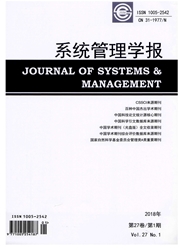

 中文摘要:
中文摘要:
以居民出行目的地选择为研究对象,确定影响居民出行目的地选择影响因素集合,分析居民出行目的地选择规律及影响因素特征。运用贝叶斯理论,设计居民出行目的地选择流程。对居民出行决策数据进行数据整理分析和离散化处理,采用K2算法对居民出行目的地选择决策数据进行贝叶斯网络结构学习和参数估计。构造居民出行目的地选择的贝叶斯网络模型,分析了模型父节点与子节点之间的概率依赖关系。对构建的贝叶斯网络模型进行了有效性验证,检验数据分析表明,贝叶斯网络对居民实际出行目的地选择的预测分析具有较高的精度。
 英文摘要:
英文摘要:
This paper presents a Bayesian method for travel destination choice of urban residents. We develop a Bayesian approach for learning Bayesian networks from a combination of prior knowledge and statistical data, which is derived from an inhabitant trip survey in Jilin, China. We expound a methodology for assessing informative priors needed for Bayesian network learning. We studies structure learning of Bayesian networks for knowledge discovery and decision supporting system. The Decision Tree Algorithm is used to discrete the continuous attributes in database of the destination choice. Bayesian network model in the travel decision supporting system is obtained by K2 algorithm, which draw a Directed Acyclic Graph (DAG) that can express the relationship between several nodes. We conduct a case study on inhabitant destination choice with Bayesian methods based on discrete decision model. We calibrate the model and design simulation process of destination choice for the residents to explain the many factors which affect the destination choice decision. We also use Bayesian networks to analyze how many factors can affect the destination choice decision, and the relationship between the factors. We then describe a methodology for evaluating Bayesian network learning algorithm, and compare this approach with various approaches. We analyze the prediction results which have a higher prediction accuracy from the disaggregate level.
 同期刊论文项目
同期刊论文项目
 同项目期刊论文
同项目期刊论文
 期刊信息
期刊信息
